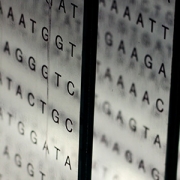Genomes without borders
As Scotland joins the 100,000 Genomes Project, we explore the impact of their investment and potential for further international links
The 100,000 Genomes Project (100KGP) is expanding its reach, working with the Scottish Genome Partnership to make genome sequencing and analysis in search of a genomic diagnosis available to Scottish NHS patients.
The $1,000 genome
The Scottish Genome Partnership (SGP) is a collaborative venture established by the Universities of Edinburgh and Glasgow in 2015, specifically between Edinburgh Genomics and Glasgow’s Wolfson Wohl Cancer Centre. A £15 million investment allowed the acquisition of company Illumina’s HiSeq X-10, the array of super-powered sequencing machines that first broke the fabled ‘$1000 genome’ price tag.
This ambitious target was set by the original international Human Genome Project; although determining the sequence of the first whole human genome took 13 years and cost a massive $2.7 billion, the project also sought to drive new technological developments that would reduce DNA sequencing costs and increase speeds. Funding was made available to encourage academic and commercial researchers to develop sequencing technologies with a target of sequencing a whole genome – at first for US $100,000 and, once this was achieved, for $1,000 (around £700).
Illumina finally broke this barrier in 2014 – although only for customers able to invest the £10 million needed to buy a HiSeq-X10 and sequence enough samples to make these low costs feasible. The company partnered early on with Genomics England and the Wellcome Trust to create the Genomics England Sequencing Hub in Hinxton, Cambridgeshire, which powers DNA sequencing for the 100KGP and NHS England.
The Scottish Genome Partnership
Like their much larger English counterpart, the Scottish Genomes Partnership has prioritised patients with rare diseases and cancer, working alongside NHS Scotland. Longer term, it aims to focus also on patients with central nervous system (CNS) disorders, genomic studies of the Scottish population, and on sequencing the genomes of infectious disease agents (pathogens), plants and animals.
The Scottish Minister for Sport, Health Improvement and Mental Health, Jamie Hepburn MSP, has announced a further £6 million investment in the SGP – £4 million from Scotland’s Chief Scientist Office and £2 million from the UK Medical Research Council – along with the news that the SGP will be partnering with Genomics England to help ensure access to a potential genetic diagnosis for Scottish patients with undiagnosed rare diseases. The first patients are expected to be enrolled by summer 2016.
A new generation of Genomic Medicine Centres
In Northern Ireland, the government pledged a £3.3 million investment to create a Genomic Medicine Centre linked to the 100KGP last year, as well as recently promising extra funds to ensure that patients will be able to access genetic tests approved by the UK Genetic Testing Network (UKGTN).
Countries outside the UK with similar aspirations may be interested in a new promotional brochure released by the government, offering them the opportunity to learn and benefit from the UK’s 100,000 Genomes Project – including allowing the NHS to establish Genomic Medicine Centres in partner countries. Although the aim of the 100KGP is to provide better care for NHS patients via genomics, it may inspire or directly assist other nations to do the same for their own citizens.
–









